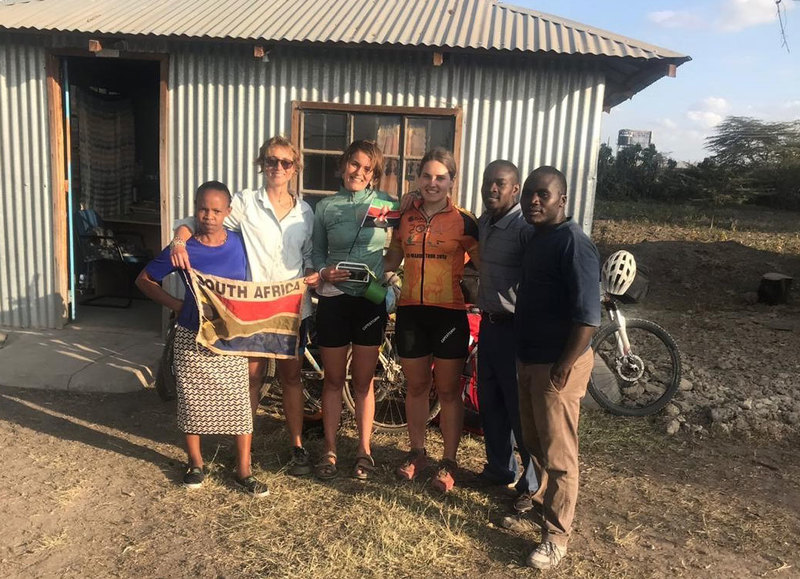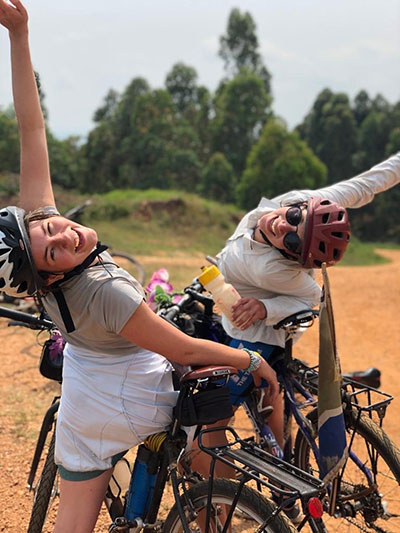The thesis corrections that almost got away
30 January 2020 | Story Helen Swingler. Photos Supplied. Read time 4 min.
Handing in final thesis corrections can be a fraught time, especially deep in rural Africa, on a bicycle, without Wi-Fi, only hours from deadline. But serendipity can be a girl’s best friend, as master’s graduate (civil engineering) Suzanne Lambert discovered.
Lambert was part of a University of Cape Town (UCT) student and alumnus group who tackled the year-long Our Africa Polé-Polé, a cycling adventure to see nine African countries through the lens of development and innovation. The group made it home on 17 December 2019.
Among her challenges, Lambert had to turn in the final corrections on her master’s thesis, which investigated the feasibility of “growing” bio-bricks using microbially induced calcium carbonate precipitation, with human urine as a source of urea. In 2018 Lambert made world headlines when she unveiled the world’s first bio-brick using human urine, a paradigm shift in waste recovery.
Crocodiles and bad Wi-Fi
“I somehow managed to finish my touch-ups and examiners’ report on my thesis and graduated in December – unfortunately, I was still on the bicycle so couldn’t make the ceremony. This was largely thanks to my superhuman of a supervisor, Dr Dyllon Randall, who bore with sporadic email replies, always subject to the availability of signal, and once a phone call from a riverside, hallmarked by local children warning ‘Crocodile! Crocodile!’ in the background.
“Not only this, but his constant readiness to put other things aside and help, no matter the circumstance.”
“We experienced it all: broken bikes, corrugation, sand, more sand, 40-degree heat, baobabs, bushflies, broken down buses.”
But good fortune played a large part in the timely hand-in, said Lambert.
“Unluckily, the time I got my thesis back from the external examiners coincided with our departure from the accessible and cheap 3G and 4G we’d experienced all the way down Africa. It also coincided with a bout of vomiting and diarrhoea, which afflicted three of us a week before entering the Luangwa Valley in Zambia.

“We spent our first day at the clinic, not feeling so lekker, with the doctor telling [teammate] Lauren, ‘You look see-through; we need to put you on a drip’. We recovered quickly though, and the next day we were back on our bikes, crossing the border over to Zimbabwe.”
But the Zimbabwe side was fraught with obstacles, delaying their exit from the Luangwa Valley.
A lift in time
“We experienced it all: broken bikes, corrugation, sand, more sand, 40-degree heat, baobabs, bushflies, broken-down buses in the middle of the bush, and the calls of hyenas and lions in the distance (the lions, we later found out, were the sounds of a human snoring).”
But no decent Wi-Fi signal.
And then luck turned up in a four-wheel drive.
“It was D-day (thesis deadline-day), and we cycled up the steep escarpment, the valley becoming smaller and smaller at our backs. I had to find my way to a town as soon as possible and so I looked out for a truck or bakkie I could hitch a lift with.
“Around the corner, like a page out of a story book, a friend I haven’t seen since high school drove past in his Land Cruiser, coming from a remote game park in Mozambique. The odds really were unfathomable!
“Armed with sandwiches and cold water, he gave us a lift all the way to Harare, where I spent the evening on some go-o-o-od quality Wi-Fi, getting my thesis in, with absolutely no time to spare!”
Lambert graduated cum laude in December, in absentia.
 This work is licensed under a Creative Commons Attribution-NoDerivatives 4.0 International License.
This work is licensed under a Creative Commons Attribution-NoDerivatives 4.0 International License.
Please view the republishing articles page for more information.










